OVERVIEW
01
GLOBALISATION &
ECONOMIC CHANGE
A shift from manufacturing towards the service sector in Western European economies leads to the deregulation of financial services.
These shifts, combined with the effects of globalisation, create social divides that far right groups will seek to exploit.
READ THIS PART
02
NATIONAL FRONT BECOMES A POLITICAL FORCE
In France, the National Front makes headway.
READ THIS PART
03
THE FALL OF THE BERLIN WALL & THE BREAKUP OF THE SOVIET UNION
The revolutions of 1989 sees communist regimes fall across Central and Eastern Europe, and the break-up of the Soviet Union.
READ THIS PART
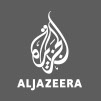
THE BIG PICTURE: THE MAKING AND BREAKING OF EUROPE
01
Globalisation & economic change
>
British Prime Minister Margaret Thatcher shares a joke with American President Ronald Reagan, at No. 10 Downing Street, London. | PHOTO BY KEYSTONE/GETTY IMAGES
“Britain was known as the sick man of Europe. Mrs Thatcher delivered what some would call shock therapy”
NORMAN LAMONT
INTERVIEW
“Where post-war Europe had been built on primary industry, coal building, ship building, car manufacturing and so on, you see the economy has shifted towards the service sectors. So the de-regulation of the banking system and so on, the opening up of financial markets, financial services, is one of the most enormous economic changes of the modern European times.”
Dan Stone
WATCH
The changes were led by Margaret Thatcher’s Conservative government, which pushed through radical reforms.
The shift to the right of mainstream politics that had sidelined the British far right, was matched by changes to the economy that proved to be both decisive and divisive.
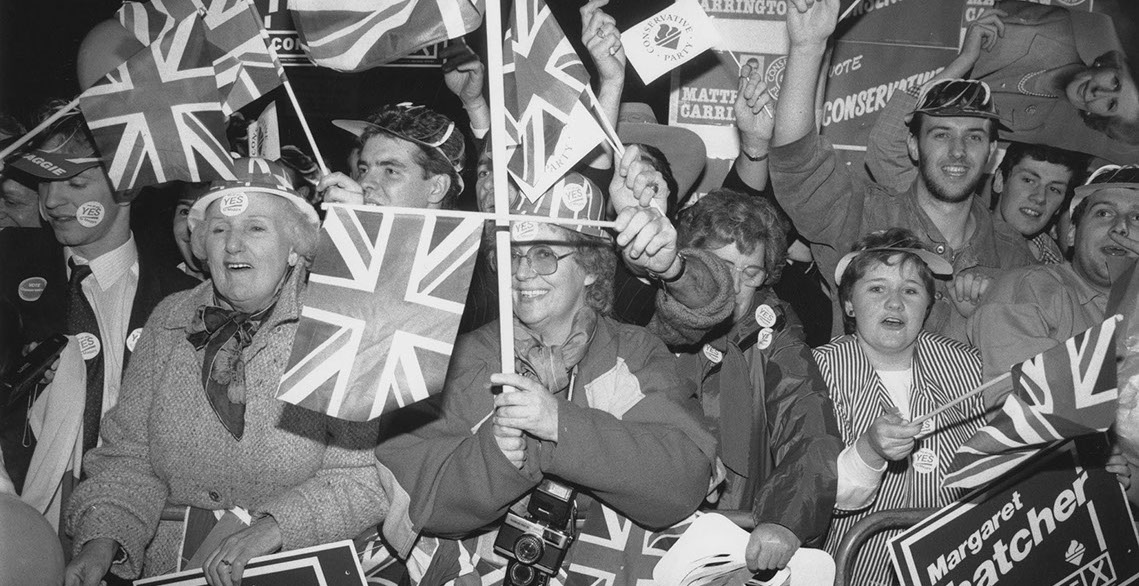
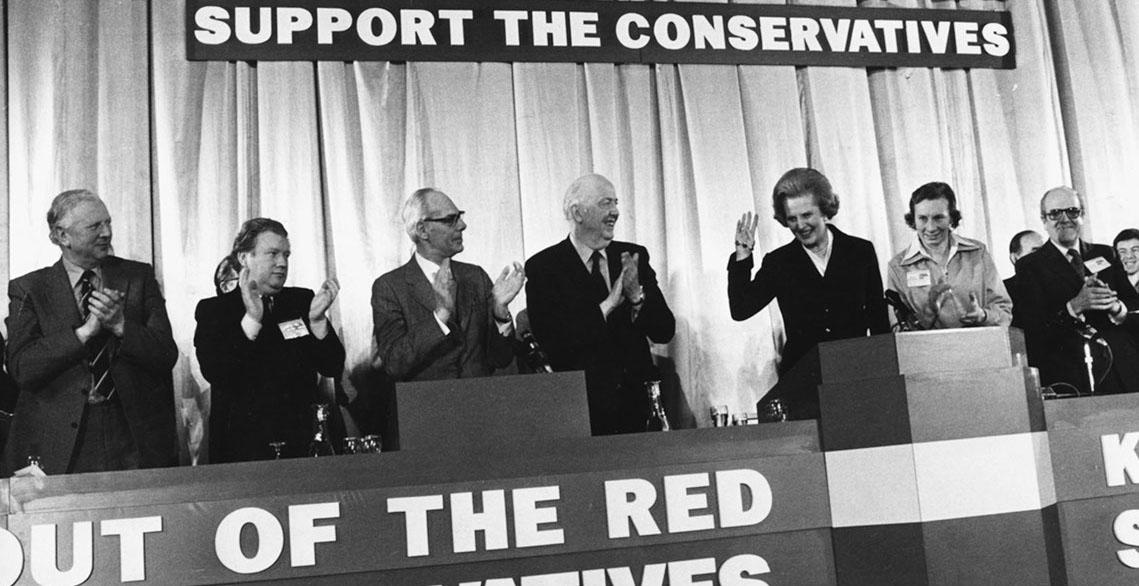
Supporters outside the Conservative Party Headquarters on election night, June 11, 1987. | PHOTO BY KEYSTONE/HULTON ARCHIVE/GETTY IMAGES
British Prime Minister Margaret Thatcher receiving a standing ovation from the other politicians at the Conservative Party Conference in Bournemouth, March 24th 1980. | PHOTO BY KEYSTONE/HULTON ARCHIVE/GETTY IMAGES
1 - 2
<
>
INTERVIEW
“This is the beginning of what nowadays we would call neo-liberalism, it’s the free market has to be the dominant way in which society is organised.”
Arun Kundnani
WATCH
INTERVIEW
“Lots of communities in the northeast of England or the northeast of France near the Belgian border where places that have been reliant on single industries are now in massive decline. This allows, I think, for those incubating far right movements of the post-war period a kind of opportunity.”
Dan Stone
WATCH
The country that had long remained in post-war Europe’s shadow, would now light a new way for others to follow...
And the far right to exploit.
02
National Front becomes a political force
>
April 9, 1986: The French leader of the National Front, Jean-Marie Le Pen, speaking in front of the National Assembly. | PHOTO BY PATRICE COTTEAU/KEYSTONE/GETTY IMAGES
In 1983, French President Francois Mitterrand’s socialist coalition was roundly defeated by right-wing opposition in municipal elections.
The following year, a controversial television appearance by the leader of the National Front, would help the president reclaim ground lost to the mainstream right, and, lead his critics to question the opportunistic timing.
INTERVIEW
“One of the most important things was that Le Pen got on one of the most-watched programmes in a debate and Le Pen turned out to be a fantastic speaker. On top of that, the party was modern, had very good propaganda, targeted pretty much guest workers and targeted the elite for either not discussing it or for allegedly siding with guest workers.”
Cas Mudde
WATCH
>
Jean-Marie Le Pen on the set of 'L'Heure de Vérité' TV programme. | PHOTO BY JEAN-FRANÇOIS RAULT/SYGMA VIA GETTY IMAGES
Jean-Marie Le Pen’s National Front was largely absent from mainstream French television, but his 1984 appearance on the political debate programme L’Heure de Verite was a milestone that, four months later, helped secure 2.2 million votes in the European Parliamentary elections.
The National Front’s grab of right-wing votes away from mainstream right-wing parties struck a chord with France’s left-wing president.
In 1985, in what some claimed to be cynical manipulation of national politics, Mitterrand changed France’s electoral system to proportional representation. It was a move that the following year, would help the National Front claim 35 seats in the French National Assembly.
French legislative election, 1986
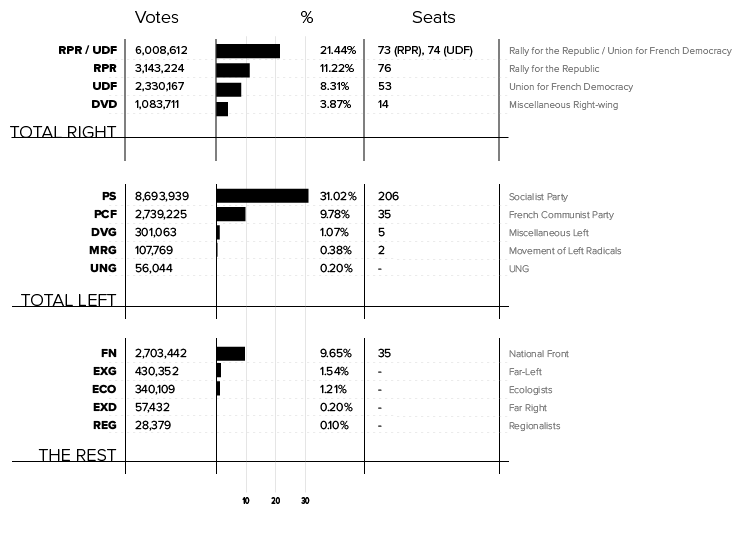
INTERVIEW
“What happened was that not just Front National emerging but actually the first parties to enter the national parliament were in Belgium, the Vlaams Blok and in the Netherlands, the Centre Party. Where the Front National played a major role was that they were really the inspiration of other parties.”
INTERVIEW
“What he was trying to do was use these National Front to damage the centre-right, in order to bolster his own electoral prospects. But that lets the genie out of the bottle, and the FN more importantly, symbolically, it begins to acquire credibility.”
Matthew Goodwin
WATCH
Cas Mudde
The National Front’s electoral success would lay the foundations for other far right groups to come.
The 1980s had also seen the European Economic Community grow to include Spain, Portugal and Greece.
The European project that had been patiently evolving, was beginning to gather pace.
The 1980s drew to a close with increasing Western European unity.
But the East would experience a seismic contraction.
03
The fall of the Berlin wall & the breakup of the Soviet Union
>
East Berliners climb onto the Berlin Wall to celebrate the effective end of the city's partition, December, 31 1989. | PHOTO BY STEVE EASON/HULTON ARCHIVE/GETTY IMAGES
In 1989, the Soviet Union was on the verge of collapse.
President Mikhail Gorbachev’s perestroika reforms had failed to dampen dissent, particularly in satellite states - nowhere more so than East Germany.
The West had won the ideological war, and the fall of the Berlin Wall would symbolise the end of the 20th century’s ‘grand narrative’.
Nationalism, suppressed and manipulated by Soviet power for half a century, was now freed from the communist yoke.
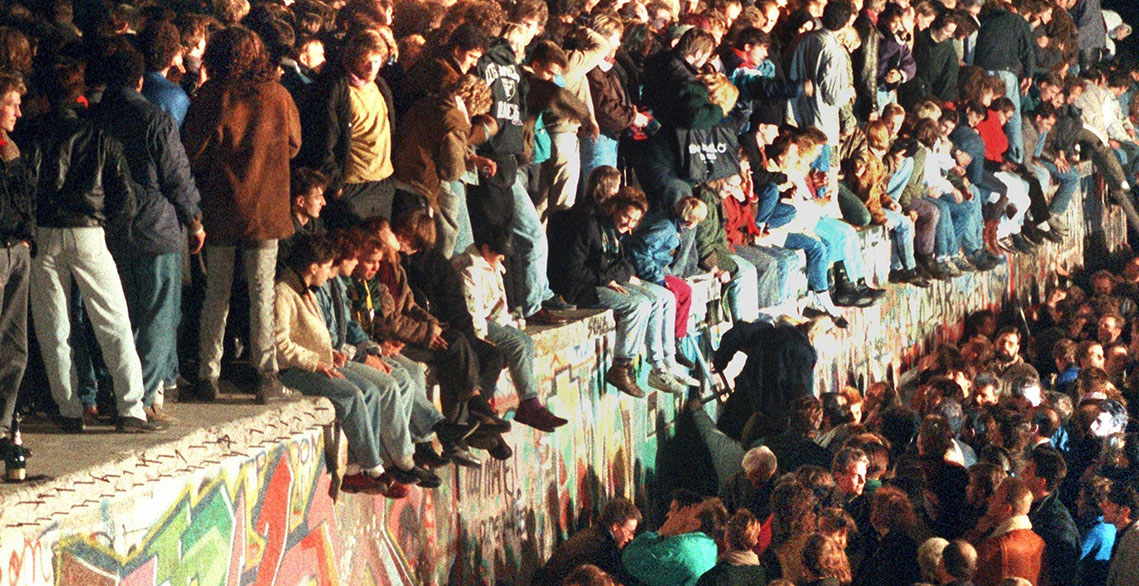
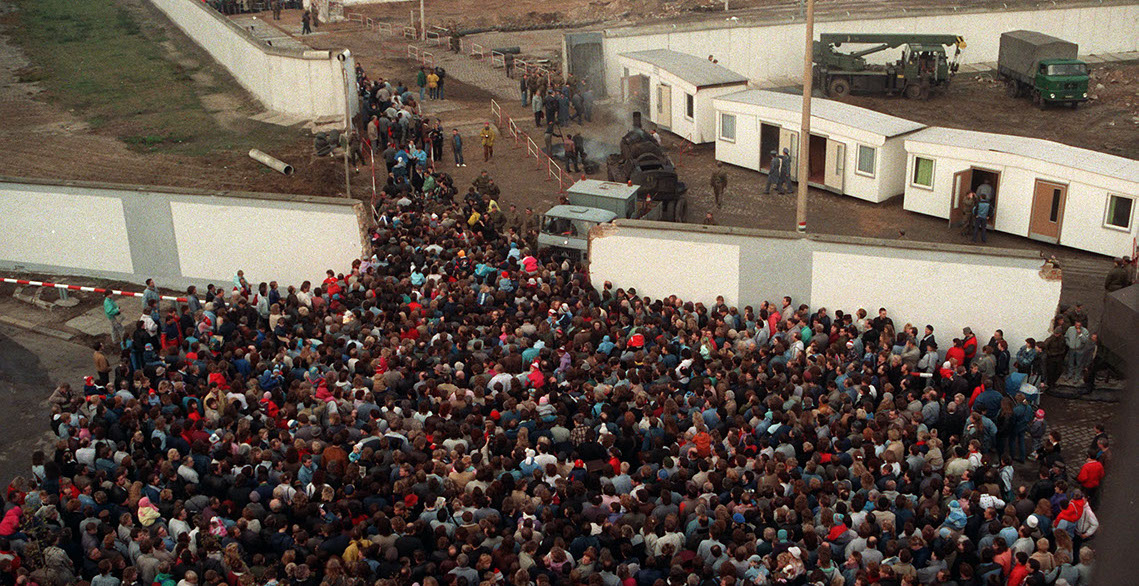
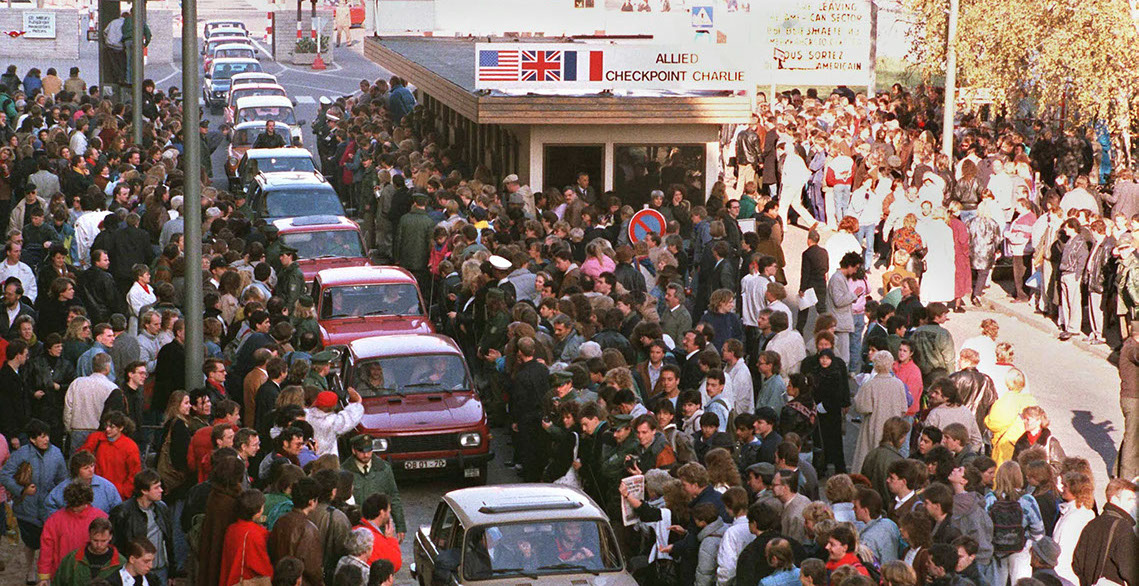
People with sparklers celebrating the opening of the inner-German border on the Berlin Wall in Berlin | PHOTO: EPA/STR
East Berlin residents waiting to cross into the West Berlin at the new border crossing on Bernauer Strasse after the fall of the Berlin Wall. | PHOTO: EPA/STR
A line of East German Trabant cars passing through Checkpoint Charlie into the West Berlin after the fall of the Berlin Wall/ | PHOTO: EPA/STR
3 - 3
<
>
1980s
THE MAINSTREAMING OF FAR RIGHT RHETORIC
ON IMMIGRATION
Return to top
ΝΕΧΤ:
1990s
COLLAPSE OF THE SOVIET UNION
& FURTHER EUROPEAN INTEGRATION
